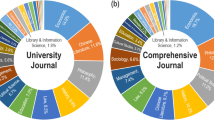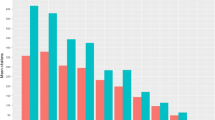Abstract
Retraction is the process of removing an article from the scientific records after it has been published. The objective of the study is to explore the influence of the number of retracted papers on the journal quality parameters in the subject of Psychology. The study has applied Pearson Coefficient Correlation to establish the relationship between the number of retracted papers and bibliometric parameters of journal evaluation. All the retracted journal articles indexed in the Scopus database up to the year 2022 in the subject of Psychology, were considered for the study. The Software tools, i.e. MS Excel, and statistical software R Studio® (version 3.6.1) along with the Biblioshiny bibliometrics package were used for data analysis. Bibliometrics indicators, i.e. SJR, total citations count, and h index of the journals, were retrieved from the website of Scimago Journal Ranking (www.scimagojr.com), and the Journal Impact Factor (IF) 2022 was used for the analysis. The results revealed a set of 180 journal articles scattered across 99 journals, that were retracted in the subject of Psychology. Among these 36% of the retracted papers were published as open access. From the analysis, it was concluded that there is a positive correlation between the number of retracted papers and bibliometric indicators i.e., impact factor, h-index, total citation counts, and JCR. On the other hand, there is the least influence of the number of retracted articles with SJR (0.024) and IF (0.072). However, a visible and normal co-relation was found among the total citation counts (0.170) and h-index (0.136), respectively. The findings of the study revealed that there is the least correlation between the number of retracted journal articles and the journal evaluation indicators; therefore, journal publishers must include a retraction policy to enhance the journal’s reputation.



Similar content being viewed by others
Data availability
The bibliographic data was collected from the Scopus (www.scopus.com) database on 13th August, 2023. For the analysis of bibliometric indicators, i.e. SJR, total citations count and h index of the journals, were retrieved from the website of Scimago Journal Ranking (www.scimagojr.com), and the Journal Impact Factor (IF) 2022 was used for the analysis was collected from JCR Report, on request and further verified from the respective journal website. The datasets generated are available from the corresponding author upon reasonable request.
References
Ajiferuke, I., Adekannbi, JO. (2020). Correction and retraction practices in library and information science journals. Journal of Librarianship and Information Science 52(1), 169–183. https://doi.org/10.1177/0961000618785408
Bakker, M., Wicherts, JM. (2011). The (mis)reporting of statistical results in psychology journals. Behavior Research Methods 43(3), 666–678. https://doi.org/10.3758/s13428-011-0089-5
Brembs, B., Button, K., & Munafò, M. (2013). Deep impact: Unintended consequences of journal rank. Frontiers in Human Neuroscience, 7.https://doi.org/10.3389/fnhum.2013.00291
Craig, R., Cox, A., Tourish, D., Thorpe, A. (2020). Using retracted journal articles in psychology to understand research misconduct in the social sciences: What is to be done? Research Policy 49(4), 103930. https://doi.org/10.1016/j.respol.2020.103930
Huh, S., Kim, SY., Cho,. HM. (2016). Characteristics of retractions from Korean Medical Journals in the KoreaMed database: A bibliometric analysis. PLoS One 11(10), e0163588. https://doi.org/10.1371/journal.pone.0163588
Katavić, V. (2014). Retractions of scientific publications: Responsibility and accountability. Biochemia Medica 24(2), 217–222. https://doi.org/10.11613/BM.2014.024
Malkov, D., Yaqub, O., Siepel, J. (2023). The spread of retracted research into policy literature. Quantitative Science Studies 4(1), 68–90. https://doi.org/10.1162/qss_a_00243
Modukuri, S. A., Rajtmajer, S., Squicciarini, A. C., Wu, J., & Giles, C. L. (2021). Understanding and Predicting Retractions.
Morís Fernández, L., Hardwicke, T. E., & Vadillo, M. A. (2019). Retracted papers clinging on to life: An observational study of post-retraction citations in psychology [Preprint]. PsyAr**v https://doi.org/10.31234/osf.io/cszpy
Pashler, H., Wagenmakers, E. (2012). Editors’ introduction to the special section on replicability in psychological science: a crisis of confidence? Perspectives on Psychological Science 7(6), 528–530. https://doi.org/10.1177/1745691612465253
Resnik, DB., Wager, E., Kissling, GE. (2015). Retraction policies of top scientific journals ranked by impact factor. Journal of the Medical Library Association: JMLA 103(3), 136–139. https://doi.org/10.3163/1536-5050.103.3.006
Simmons, JP., Nelson, LD., Simonsohn, U. (2011). False-positive psychology: undisclosed flexibility in data collection and analysis allows presenting anything as significant. Psychological Science 22(11), 1359–1366. https://doi.org/10.1177/0956797611417632
Wager, E., Barbour, V., Yentis, S., Kleinert, S. (2009). Retractions: Guidance from the Committee on Publication Ethics (COPE). Croatian Medical Journal 50(6), 532–535. https://doi.org/10.3325/cmj.2009.50.532
Wicherts, JM., Bakker, M., Molenaar, D. (2011). Willingness to share research data is related to the strength of the evidence and the quality of reporting of statistical results. PLoS One 6(11), e26828. https://doi.org/10.1371/journal.pone.0026828
Yang, S., Qi, F., & Diao, H. (2020). Exploring the influence of publication retraction on citations in psychology science. Proceedings of the ACM/IEEE Joint Conference on Digital Libraries in 2020, 501–502 https://doi.org/10.1145/3383583.3398583
Yang, S., Qi, F., Diao, H., & Ajiferuke, I. (2022). Do retraction practices work effectively? Evidence from citations of psychological retracted articles. Journal of Information Science, 016555152210976 https://doi.org/10.1177/01655515221097623
Acknowledgements
We extend our gratitude to Dr. Satish Kumar, Deputy Librarian, IIT (ISM) Dhanbad for generously sharing the data of Journal Impact Factor 2022 from the Journal Citation Report. We are also deeply thankful to Prof. Jaideep Sharma, Professor, Faculty of Library and Information Science, Indira Gandhi National Open University, New Delhi, for his invaluable guidance throughout the course of this research.
Author information
Authors and Affiliations
Corresponding author
Ethics declarations
Ethics statement
No human participants were interviewed for this study, which involves the analysis of archival publishing data. Thus, we have depended on the journals whose data have been studied to comply with the 1964 Declaration of Helsinki and its later addenda.
Conflict of interest
On behalf of all authors, the corresponding author states that there is no conflict of interest.
Additional information
Publisher’s Note
Springer Nature remains neutral with regard to jurisdictional claims in published maps and institutional affiliations.
Supplementary Information
Rights and permissions
Springer Nature or its licensor (e.g. a society or other partner) holds exclusive rights to this article under a publishing agreement with the author(s) or other rightsholder(s); author self-archiving of the accepted manuscript version of this article is solely governed by the terms of such publishing agreement and applicable law.
About this article
Cite this article
Behera, P.K., Jain, S.J. & Kumar, A. Examining retraction counts to evaluate journal quality in psychology. Curr Psychol (2024). https://doi.org/10.1007/s12144-024-06044-y
Accepted:
Published:
DOI: https://doi.org/10.1007/s12144-024-06044-y




